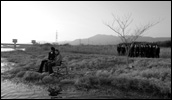Be Sure to Share
- Year
- 2009
- Original title
- Chanto Tsutaeru
- Japanese title
- ちゃんと伝える
- Director
- Cast
- Running time
- 109 minutes
- Published
- 29 March 2010



by Rowena Santos Aquino
Filmmaker Sion Sono has established quite the reputation of (for lack of a better word) "extreme cinema." "User-frenzy" rather than "user-friendly" would be more like it to describe the highly kinetic, highly passionate and violent characters and experiences his films offer (Suicide Club, Exte). Given this context, seeing Sono's name associated with a cancer-melodrama can understandably provoke an about-face. That his prior film was the nearly four-hour long, convoluted, hyper-manic love story Love Exposure (Ai no Mukidashi) makes Be Sure to Share's existence all the more surprising. However, in Be Sure to Share Sono channels his talent and energy for over-the-top, off-kilter vision and filmmaking towards a quieter, subtler but equally moving work about family, memory, and the fragility of both.
The crux of the film is the father and son relationship (the film has been said to be Sono's reaction to his own father's recent death). The father and son are played wonderfully by Eiji Okuda and Akira (member of the Japanese R&B group Exile, in one of his first films), respectively. Their relationship is rendered fragile because of the cancer that comes to afflict Shiro's father. However, their bond becomes stronger in all its tragic irony when Shiro himself is diagnosed with cancer - which he refuses to divulge to anyone, except his girlfriend (Ito). In the face of a terminal illness that afflicts a loved one, it goes without saying that time becomes both hyper-real and surreal.
Sono really and simply takes up the different shapes and dimensions that time takes on when caring for, or knowing, someone with an illness. The kind of time invested in the daily effort and routine of going to the hospital, expressed through repeated scenes of gestures and situations by both Shiro and his mother (Takahashi). There is also the kind of time that exists between the increasingly rare occurrences of physical contact and/or intimacy, which provokes the touching scene of the father asking his wife to lie next to him in his hospital bed. There is also the kind of time characterised by an increasingly acute closeness with one's past in relation to the person afflicted with the illness: in this case, the memories of Shiro's father as a teacher, coach and father all rolled into one, and the emotional havoc that it wreaked on his life while growing up.
Thinking in the future tense about one's life, however much of a struggle and however short-term, is also present and made tangible through Shiro's girlfriend. The idea of marriage persists, even after Shiro finds out about his diagnosis. Even the film makes tangible the conditional/subjunctive mood, as it puts together the wishes and desires of both Shiro and his father in the face of the uncertainty of things.
The film shifts frequently across these different life tenses, and throws out the window any linear, simplifying chronology to get to know this family's pain as well as little pleasures or joys. The resulting cinematic time-space continuum is nothing short of poignant and affecting. In particular, novice-to-the-screen Akira gives an impressive, nuanced performance of the small, everyday battles and triumphs involved in navigating a condition that must change one's perspective about, well, everything.
Be Sure To Share is not without its moments of surprise that call for a difference in perspective on the spectator's part as well. In a display of love and promise that rejects the boundary between life and death, Shiro takes his father's funeral procession to the riverbank, where he fulfills his word to go fishing with his father. Gasps of squeamishness could be heard in the theatre when Shiro takes his father from his coffin and places him on a bench overlooking the river. For some, Shiro's gesture may drive the film's quiet melodrama towards the grotesque or even beyond. If that's the case, so be it. But over and above the apparent shock of such a move - which it certainly didn't intend - is the sincere and powerful emotion that compels Shiro to do what he does. Ultimately, the affective force of this sequence reminds one that Be Sure To Share is not the standard drama about dealing with illness, family and grief. It may be a "smaller" film than Love Exposure in the context of Sono's overall filmography, but in the end it may not be as distantly removed from it as one might think.